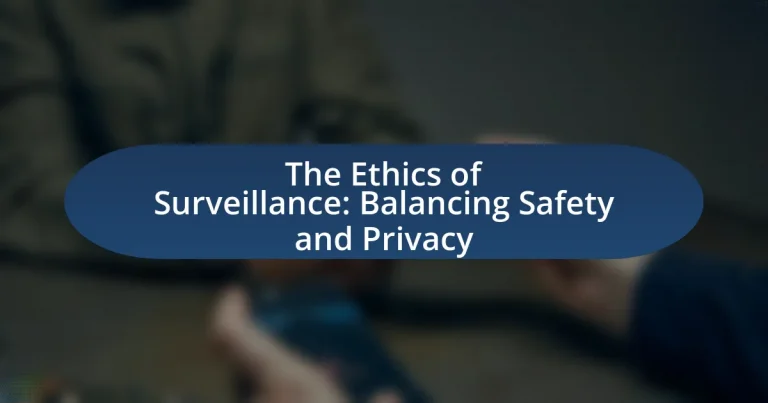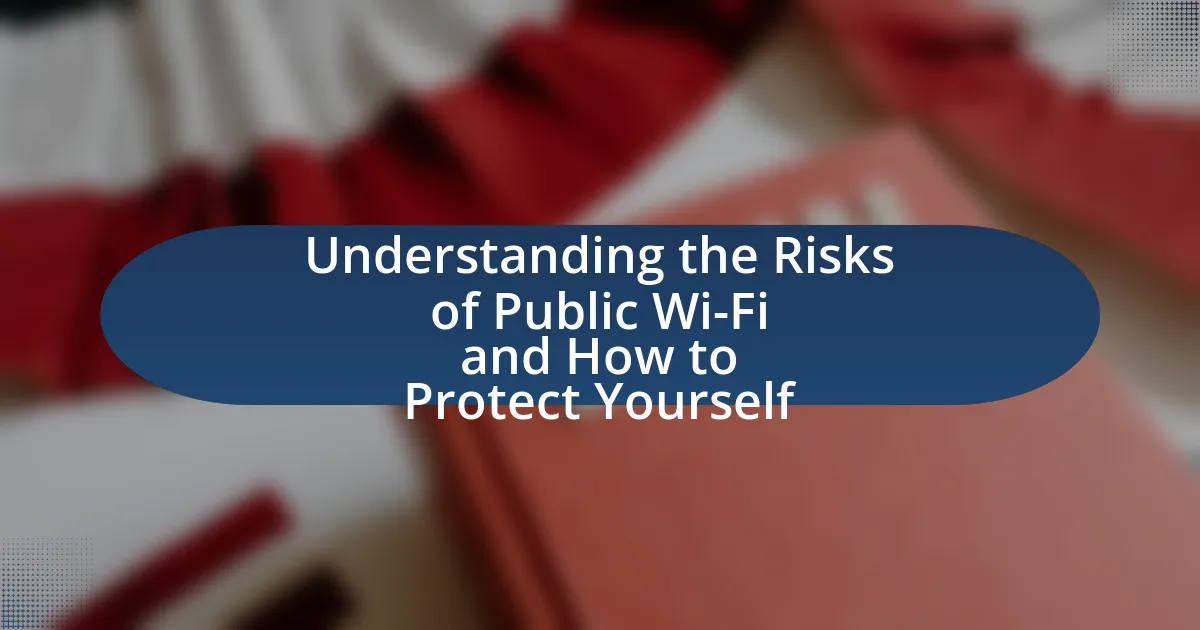The article examines the ethics of surveillance, focusing on the critical balance between safety and privacy. It outlines fundamental concepts such as privacy, consent, transparency, accountability, and proportionality, which are essential for ethical surveillance practices. The discussion includes various surveillance methods, the intersection of surveillance with ethical theories, and the historical events that have shaped current discourse. Additionally, it addresses the impact of societal values on perceptions of privacy, the legal frameworks governing surveillance, and the potential benefits and risks associated with surveillance data. The article emphasizes the importance of transparency, accountability, and public awareness in navigating the ethical challenges of surveillance.
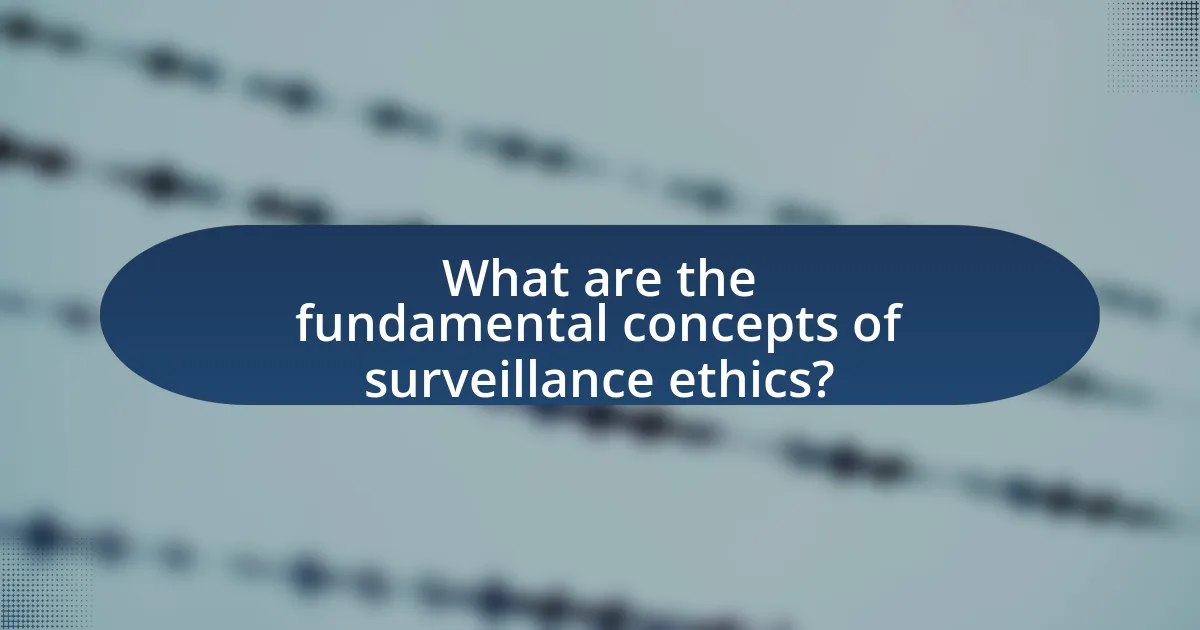
What are the fundamental concepts of surveillance ethics?
The fundamental concepts of surveillance ethics include privacy, consent, transparency, accountability, and proportionality. Privacy refers to the right of individuals to control their personal information and the extent to which it is collected and used. Consent emphasizes the necessity of obtaining permission from individuals before surveilling them, ensuring that they are aware of and agree to the surveillance measures in place. Transparency involves clear communication about surveillance practices, allowing individuals to understand how their data is being collected and utilized. Accountability requires that organizations and governments are held responsible for their surveillance actions, ensuring that there are mechanisms in place to address misuse or abuse. Proportionality dictates that surveillance measures should be appropriate and necessary for the intended purpose, avoiding excessive or intrusive practices. These concepts are essential for maintaining a balance between safety and privacy in surveillance practices.
How do we define surveillance in the context of ethics?
Surveillance in the context of ethics is defined as the systematic monitoring of individuals or groups, often by governments or organizations, with the intent to gather information while balancing the implications for privacy and civil liberties. Ethical considerations arise from the potential for abuse of power, invasion of privacy, and the impact on individual autonomy, as highlighted in the work of scholars like David Lyon, who emphasizes the need for accountability and transparency in surveillance practices.
What are the different types of surveillance methods?
The different types of surveillance methods include physical surveillance, electronic surveillance, and data surveillance. Physical surveillance involves direct observation of individuals or locations, often used by law enforcement to monitor criminal activity. Electronic surveillance encompasses the use of devices such as cameras, wiretaps, and GPS tracking to gather information remotely. Data surveillance refers to the collection and analysis of digital information, including internet browsing habits and social media activity, often conducted by corporations and government agencies to track behavior and preferences. Each method raises ethical considerations regarding privacy and consent, highlighting the need for a balance between safety and individual rights.
How does surveillance intersect with ethical theories?
Surveillance intersects with ethical theories primarily through the tension between utilitarianism and deontological ethics. Utilitarianism evaluates actions based on their outcomes, often justifying surveillance as a means to enhance public safety and reduce crime, as seen in studies indicating that surveillance can deter criminal behavior. Conversely, deontological ethics emphasizes the intrinsic rights of individuals, arguing that surveillance infringes on privacy rights and autonomy, which are fundamental moral principles. This ethical conflict is evident in legal frameworks, such as the General Data Protection Regulation (GDPR) in Europe, which prioritizes individual privacy rights while acknowledging the need for security measures. Thus, the intersection of surveillance and ethical theories reveals a complex balance between societal safety and individual rights.
Why is the balance between safety and privacy important?
The balance between safety and privacy is important because it ensures that individual rights are protected while maintaining societal security. When safety measures, such as surveillance, are implemented without regard for privacy, it can lead to abuses of power and erosion of civil liberties. For instance, studies have shown that excessive surveillance can create a chilling effect on free speech and expression, as individuals may feel monitored and thus refrain from sharing their thoughts openly. Conversely, prioritizing privacy without adequate safety measures can leave communities vulnerable to threats, such as crime or terrorism. Therefore, finding a balance is crucial to uphold both the security of society and the fundamental rights of individuals, as evidenced by legal frameworks like the General Data Protection Regulation (GDPR) in Europe, which aims to protect personal data while allowing for necessary security measures.
What historical events have shaped the discourse on surveillance ethics?
The discourse on surveillance ethics has been significantly shaped by events such as the Watergate scandal, the September 11 attacks, and the revelations by Edward Snowden. The Watergate scandal in the 1970s exposed government abuses of surveillance power, leading to increased public scrutiny and the establishment of legal frameworks like the Foreign Intelligence Surveillance Act (FISA) in 1978. The September 11 attacks in 2001 prompted the USA PATRIOT Act, which expanded government surveillance capabilities, raising ethical concerns about privacy and civil liberties. Edward Snowden’s 2013 disclosures revealed extensive global surveillance programs, igniting a worldwide debate on the balance between national security and individual privacy rights. These events collectively highlight the ongoing tension between safety and privacy in surveillance ethics.
How do societal values influence perceptions of safety and privacy?
Societal values significantly shape perceptions of safety and privacy by determining what individuals prioritize in their communities. For instance, in societies that value individualism, there is often a stronger emphasis on personal privacy, leading to resistance against surveillance measures perceived as intrusive. Conversely, in collectivist societies, where community safety is prioritized, individuals may accept higher levels of surveillance for the sake of collective security. Research indicates that cultural attitudes towards authority and trust in government also play crucial roles; societies with high trust in institutions tend to support surveillance for safety, while those with low trust often view it as a violation of privacy. This dynamic illustrates how societal values directly influence the balance between perceived safety and privacy rights.
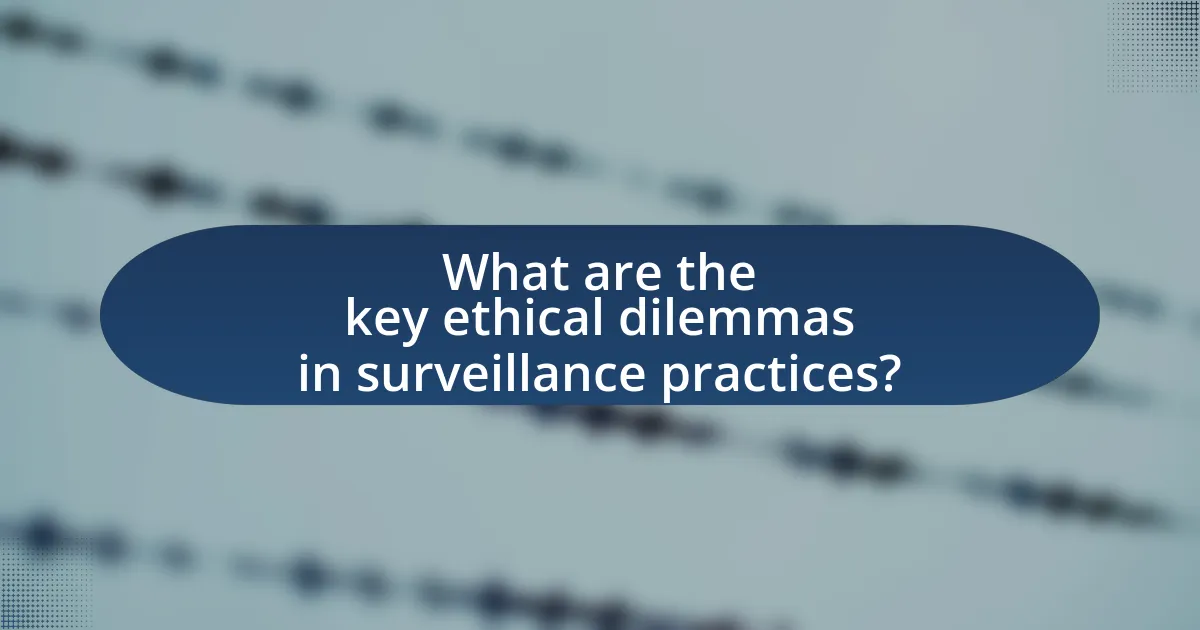
What are the key ethical dilemmas in surveillance practices?
Key ethical dilemmas in surveillance practices include the conflict between individual privacy rights and collective security needs. Surveillance often infringes on personal freedoms, leading to concerns about consent and the potential for abuse of power by authorities. For instance, mass surveillance programs can lead to unwarranted monitoring of innocent individuals, raising questions about the justification of such actions in the name of safety. Additionally, the lack of transparency in surveillance practices can erode public trust in institutions, as seen in various reports highlighting government overreach. These dilemmas necessitate a careful examination of the balance between protecting citizens and respecting their rights.
How does surveillance impact individual privacy rights?
Surveillance significantly impacts individual privacy rights by enabling the collection and monitoring of personal information without consent. This intrusion can lead to a chilling effect on free expression and behavior, as individuals may alter their actions if they believe they are being watched. For instance, studies have shown that increased surveillance correlates with decreased trust in public institutions and a heightened sense of vulnerability among citizens. According to a report by the Electronic Frontier Foundation, surveillance practices often violate established privacy laws and ethical standards, undermining the fundamental right to privacy as outlined in various human rights frameworks.
What legal frameworks govern surveillance practices?
Legal frameworks governing surveillance practices include the Fourth Amendment of the U.S. Constitution, which protects against unreasonable searches and seizures, and various federal laws such as the Foreign Intelligence Surveillance Act (FISA) and the USA PATRIOT Act. These laws establish guidelines for government surveillance, requiring warrants for certain types of surveillance and outlining the conditions under which surveillance can occur. Additionally, international frameworks like the General Data Protection Regulation (GDPR) in the European Union impose strict rules on data collection and privacy, influencing surveillance practices globally. These legal structures aim to balance the need for security with the protection of individual privacy rights.
How do different cultures view privacy in relation to surveillance?
Different cultures have varying perspectives on privacy concerning surveillance, influenced by historical, social, and political contexts. For instance, in Western cultures, particularly in the United States and parts of Europe, privacy is often viewed as a fundamental human right, leading to strong legal frameworks that protect individuals from unwarranted surveillance, such as the General Data Protection Regulation (GDPR) in the EU. Conversely, in many Asian cultures, such as in China, surveillance is frequently accepted as a means of ensuring social order and security, with citizens often prioritizing collective safety over individual privacy rights. This acceptance is reflected in the extensive use of surveillance technologies by the state, which is justified by the government as necessary for maintaining public safety. Additionally, cultural attitudes towards privacy can be shaped by historical experiences; for example, societies with a history of authoritarian rule may exhibit greater tolerance for surveillance as a trade-off for perceived security.
What are the potential benefits of surveillance for public safety?
Surveillance can enhance public safety by deterring crime, aiding in investigations, and improving emergency response. The presence of surveillance cameras has been shown to reduce crime rates; for instance, a study in the UK found that public CCTV systems led to a 20% reduction in crime in monitored areas. Additionally, surveillance footage can provide crucial evidence in criminal investigations, helping law enforcement to identify suspects and solve cases more efficiently. Furthermore, surveillance systems can facilitate quicker responses to emergencies by providing real-time information to first responders, thereby potentially saving lives.
How can surveillance technologies prevent crime and enhance security?
Surveillance technologies can prevent crime and enhance security by providing real-time monitoring and data collection that deter criminal activity. For instance, the presence of CCTV cameras in public spaces has been shown to reduce crime rates by up to 30%, as potential offenders are less likely to engage in illegal activities when they know they are being watched. Additionally, advanced analytics and artificial intelligence can identify suspicious behavior patterns, allowing law enforcement to respond proactively. Studies indicate that cities implementing smart surveillance systems experience a significant decrease in property crimes, reinforcing the effectiveness of these technologies in enhancing public safety.
What are the risks of misuse of surveillance data?
The risks of misuse of surveillance data include invasion of privacy, discrimination, and potential for abuse of power. Invasion of privacy occurs when individuals are monitored without their consent, leading to unauthorized access to personal information. Discrimination can arise when surveillance data is used to target specific groups based on race, religion, or other characteristics, resulting in biased law enforcement practices. Additionally, the potential for abuse of power is significant, as authorities may exploit surveillance data for purposes beyond public safety, such as political repression or social control. These risks highlight the need for stringent regulations and oversight to protect individual rights while utilizing surveillance technologies.
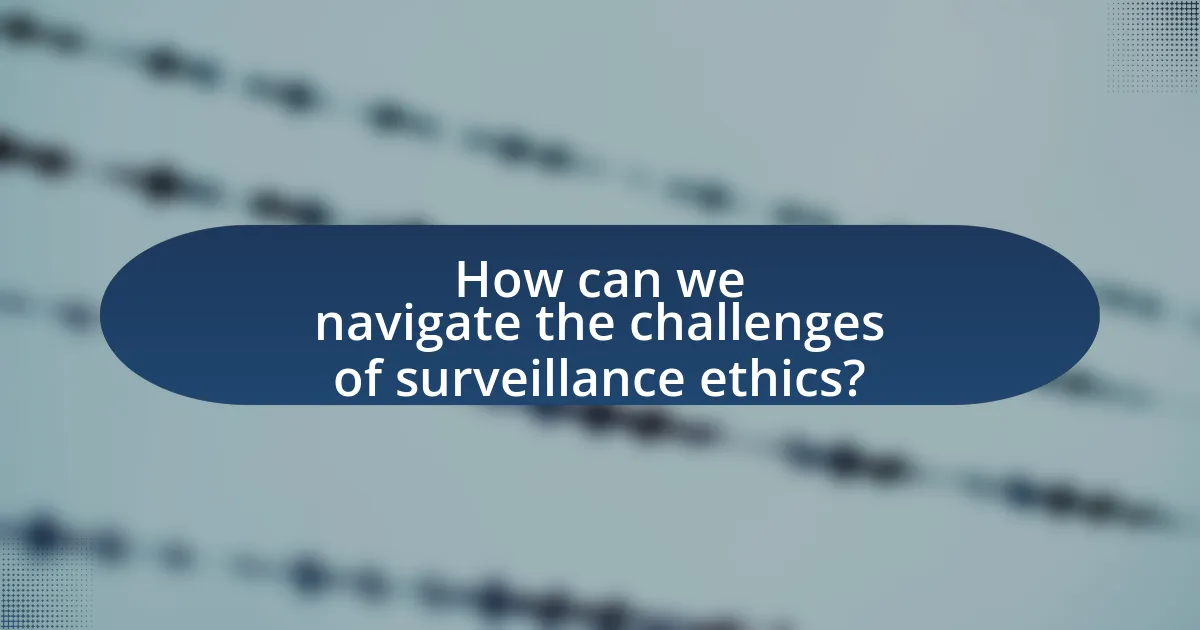
How can we navigate the challenges of surveillance ethics?
To navigate the challenges of surveillance ethics, organizations must implement transparent policies that prioritize individual privacy while ensuring public safety. This involves establishing clear guidelines on data collection, usage, and retention, as well as obtaining informed consent from individuals being monitored. Research indicates that transparency in surveillance practices can enhance public trust; for instance, a study by the Pew Research Center found that 86% of Americans believe that they have lost control over how their personal information is collected and used by companies. By actively engaging with communities and stakeholders, organizations can create a balanced approach that respects privacy rights while addressing security concerns.
What best practices can organizations adopt for ethical surveillance?
Organizations can adopt several best practices for ethical surveillance, including transparency, data minimization, and regular audits. Transparency involves clearly communicating surveillance policies to employees and stakeholders, ensuring they understand what data is collected and how it is used. Data minimization requires organizations to collect only the information necessary for specific purposes, reducing the risk of misuse. Regular audits help ensure compliance with ethical standards and legal requirements, allowing organizations to assess the effectiveness and necessity of their surveillance practices. These practices are supported by guidelines from the General Data Protection Regulation (GDPR), which emphasizes the importance of accountability and data protection in surveillance activities.
How can transparency and accountability be ensured in surveillance practices?
Transparency and accountability in surveillance practices can be ensured through the implementation of clear policies, oversight mechanisms, and public reporting. Establishing comprehensive guidelines that dictate the scope, purpose, and duration of surveillance activities is essential for maintaining transparency. Oversight bodies, such as independent review boards, can monitor compliance with these guidelines, ensuring accountability. Additionally, regular public reporting on surveillance activities, including data collection methods and outcomes, fosters trust and allows for community engagement. For instance, the USA PATRIOT Act requires periodic reports to Congress on surveillance activities, illustrating a framework for accountability in government surveillance practices.
What role does public awareness play in surveillance ethics?
Public awareness plays a crucial role in surveillance ethics by influencing public perception and policy regarding privacy and security. When individuals are informed about surveillance practices, they can engage in discussions about the ethical implications, leading to greater accountability for organizations and governments. Research indicates that heightened public awareness can result in increased demand for transparency and regulation, as seen in the aftermath of the Edward Snowden revelations, which sparked global debates on privacy rights and surveillance overreach. This awareness fosters a societal dialogue that can shape ethical standards and practices in surveillance, ensuring that safety measures do not infringe upon individual privacy rights.
What future trends should we anticipate in surveillance ethics?
Future trends in surveillance ethics will likely focus on increased regulation, transparency, and the integration of artificial intelligence in monitoring systems. As public concern over privacy grows, governments and organizations are expected to implement stricter laws governing data collection and usage, as seen with the General Data Protection Regulation (GDPR) in Europe. Additionally, there will be a push for greater transparency in surveillance practices, requiring entities to disclose how data is collected and used, which aligns with the growing demand for accountability in technology. The rise of AI in surveillance will also necessitate ethical frameworks to address biases and ensure fairness, as evidenced by studies highlighting algorithmic discrimination. These trends indicate a shift towards a more balanced approach that prioritizes individual rights while addressing security needs.
How might emerging technologies reshape the landscape of surveillance?
Emerging technologies are reshaping the landscape of surveillance by enhancing data collection, analysis, and monitoring capabilities. Innovations such as artificial intelligence, facial recognition, and the Internet of Things enable more efficient tracking and profiling of individuals, leading to increased surveillance accuracy and scope. For instance, AI algorithms can analyze vast amounts of data from various sources, allowing for real-time monitoring and predictive analytics, which can identify potential threats before they materialize. Additionally, the proliferation of smart devices contributes to a more interconnected surveillance environment, where data from personal gadgets can be aggregated to create comprehensive profiles of individuals. This transformation raises significant ethical concerns regarding privacy, consent, and the potential for misuse of surveillance data, necessitating a careful balance between safety and individual rights.
What proactive measures can individuals take to protect their privacy?
Individuals can protect their privacy by implementing strong password management practices, utilizing encryption tools, and being cautious with personal information sharing. Strong passwords, which include a mix of letters, numbers, and symbols, significantly reduce the risk of unauthorized access; studies show that 81% of data breaches are linked to weak passwords. Encryption tools, such as VPNs and secure messaging apps, safeguard data during transmission, making it difficult for third parties to intercept. Additionally, individuals should limit the amount of personal information shared on social media and review privacy settings regularly, as 70% of users are unaware of the extent of their data exposure online.
